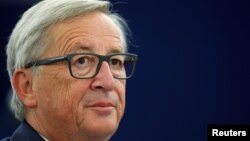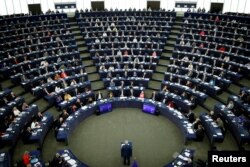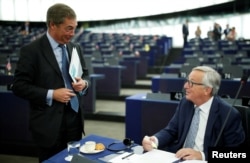European Commission chief Jean-Claude Juncker urged European Union governments on Wednesday to use economic recovery and Brexit as springboards toward a closer union, built on an expanded eurozone and a pivotal role in world trade.
In his annual State of the European Union speech, Juncker sketched out a vision of a post-2019 EU in which 30 countries would be using the euro, with an EU finance minister running key budgets to help states in trouble.
Tax and welfare standards would converge and Europe, not the United States, would be the hub of a free-trading world.
The EU chief executive stressed his wish to heal divisions between eastern and western states. He sees that as vital to countering a drive, including by founding powers France and Germany, to set up new structures within the bloc that would exclude some poorer, ex-communist members in the east.
"The wind is back in Europe's sails," Junker told the European Parliament, citing economic growth and the easing of a succession of crises — Greek debt, refugee inflows, the rise of euroskepticism reflected in Brexit — that seemed to threaten the EU's survival.
"Now we have a window of opportunity, but it will not stay open forever," he said, emphasizing a need to move on from and even profit from the British vote to leave the bloc in 2019.
"We will keep moving on because Brexit isn't everything, it is not the future of Europe," he said in a speech that Brexit supporters said showed they were right to take Britain out of a bloc set on creating more powerful, central institutions.
Juncker called on nationalist eastern leaders — though not by name — to stop defying EU courts over civil rights, and on westerners to drop attempts to keep out cheaper eastern workers or palm off inferior food in poorer national markets.
Euro for whole EU
But his core proposal for countering what is known as a "multispeed Europe" by encouraging all states to join the euro and other EU structures faces resistance in both non-eurozone countries and potentially in Paris and Berlin, where the new President Emmanuel Macron and Chancellor Angela Merkel, soon likely to be re-elected, are readying their own plans.
Macron plans to present his ideas for reforming the 19-nation eurozone on September 26, two days after the German election, a French diplomatic source said. EU officials hope leaders may discuss the issues at a dinner on September 28 before a summit in Estonia.
"If we want the euro to unite rather than divide our continent, then it should be more than the currency of a select group of countries," Juncker said. "The euro is meant to be the single currency of the European Union as a whole."
He noted that only long-standing EU members Britain and Denmark have a legal right not to adopt the euro. EU officials say that with Britain leaving, and the eight remaining non-euro states accounting for only 15 percent of EU GDP, Juncker sees it as natural for EU and eurozone policy to operate in unison.
For that reason, he rejected proposals, led by France, for a special eurozone budget, finance minister and parliament. These functions, he said, should be filled instead by a vice president of the commission, chairing the Eurogroup of 19 eurozone finance ministers and managing a eurozone budget that would be part of the budget for the whole EU, overseen by Parliament.
While Denmark in fact pegs its crown closely to the euro, a drive to push the likes of Poland and Sweden into the euro would be a hard sell in those countries, while Germany, France and others have been skeptical about letting poorer states join yet.
Juncker proposed EU funding and technical help to encourage non-euro members to get themselves into a position to join.
Euroskeptics' scorn
For Juncker, officials say, the departure of Britain, for all the difficulties it brings, means goodbye to the major power that has continually sought opt-outs from new integration projects, and offers an opportunity to end the habit for good.
"Everyone should be in everything," one senior official said.
An aide to Macron said Juncker had made "many ambitious proposals" in line with French ideas and played down divergence on eurozone reform, noting Juncker would offer final ideas only in December.
In Germany, government officials were restrained. But Beate Merk, a regional minister in Bavaria allied to Merkel, said expanding the euro to the whole EU would be "a risky experiment that would greatly heighten Europe's problems."
Euroskeptics responded critically to the commission president's speech.
Ryszard Legutko, an EU lawmaker from Poland's right-wing ruling party, warned against responding to problems with "the same old 'more Europe, more Europe' " arguments.
"That is not the answer," he said. "We need to get the EU's house in order before there can even be a discussion on centralizing even further."
Nigel Farage of the UK Independence Party said: "All I can say is, thank God we're leaving."
Farage's allies cheered when Juncker finally mentioned Brexit near the end of his speech and said the British would come to regret their "tragic" referendum decision to leave.
Looking ahead to March 30, 2019, the day when Britain will be out of the EU, Juncker said he had proposed that Romania, which will then hold its rotating presidency, should host a summit in the formerly German-speaking Transylvanian city of Sibiu. There, leaders should set out plans for a more united union, two months before voters elect a new European Parliament.







